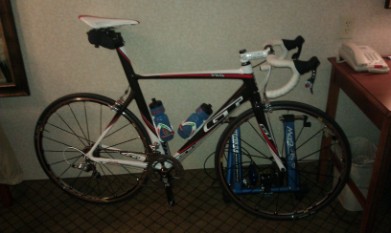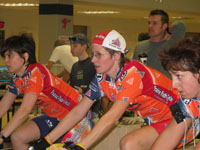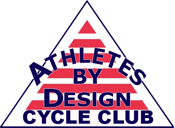Take your Vitamins & Supplements!
You don't need to be an athlete to sweat, you can be in the military. You could be a roofer, a carpenter, an electrician, a plumber, a carpet layer, you can be a farmer, you could be a dance instructor, you could work in a bakery. Or you could work in an air conditioned insurance agency or hang meat in a refrigerator room, never sweating at your work place, and then you go to a health club where you go sweat 3 nights a week. Unless you are replacing the minerals that you are sweating out, you are not going to make it to 100 and you are going to be sick and miserable the last 12 to 15 years of your life. Exercise without supplementation is a negative, not a positive. Just like running your car without oil. healthyliving.org
Travel, Hotel Living! Trainer, Bike......not fun!

END OF THE YEAR REFLECTION
After you complete your last cycling event or race of the season, take a break and then take stock. I prefer that athletes wait at least a week after the last event of the season before looking ahead to the next sport season (cyclocross, skiing, running, etc.) or next year's cycling season. The reason I prefer the athlete to step away from that last event is because emotions are too fresh and may not paint a realistic picture of the past or the future.
Once you have given yourself a break from structure and intensity, take some time to reflect on last season and begin planning for the next. These nine tips will help you put your thoughts into words and then into action:
1. What were the best parts of this season? Try to list at least three items. The items might include your favorite race experience, speed improvements in events or training, staying healthy, consistent training, traveling to new events, finding new training partners or purchasing new equipment.
2. Get specific on the highlights. For the items you listed in step 1, try to state them in a way that someone else could easily identify what you're talking about. For example, if you wrote "Had a Great Race at the Round the City Crit", expand that statement to say what made the race great. Did you place high in the field? Did you help a teammate do well? Get on the podium? If you wrote "Had a fantastic century ride", describe what elements made it fantastic?
3. Why did the specifics in step 2 trip your trigger? These elements may be covered in step 2; but if they are not, get specific about why these highlights were important to you. Perhaps you made it on the podium for the first time and this has been a three-year goal? Perhaps helping teammates in races made you feel good about giving fitness to help someone else? Maybe you rode a century with someone that really struggled, but you helped them through it. It is important to identify why results, behaviors or situations are enjoyable to you.
4. What were the greatest disappointments of your season? You may not have any disappointments or you may have a few. Go ahead and list them.
5. Get specific on disappointments. Similar to highlights, do your best to identify the specifics of a disappointing situation. If you didn't train consistently and that was disappointing, define inconsistent. For example, "I'm disappointed that I rode only two days per week for 12 of 16 weeks. There were two weeks I didn't ride at all."
6. If you could have changed anything about this season, what would that be? Improve nutrition? Include more interval training? Get more structured about training? Less structured? Improve nutrition?
7. Get specific on improvements. If you want to improve nutrition, what does that mean? An example of a nutrition improvement would be to eat two whole fruits per day, at least five days per week. Notice that the improvement or goal allows for some imperfection. Be careful about aiming for improvements that are all or nothing, requiring you to be perfect.
8. What do you want to accomplish next season? List three to six things you want to accomplish next season. What are your goals? Perhaps you want to include strength training in your workout plan. Maybe you want to complete your first week-long event. Want to try racing? Perhaps you want to stay healthy next year--avoiding illness or injury.
9. Get specific on goals. Goals can be related to a training plan, workout details, race results, lifestyle changes or stress management, to name a few. When you write down your goals, be sure you can measure success. How will you know if you've reduced stress? What will that look like? Can you see it? Feel it? In the stress example, you may need to add a descriptor. For example, "Reduce stress by attending yoga once or twice each week."
It's important to take time to reflect on your successes of last season. You may want to continue some of these successful behaviors and results. When you identify things you want to change or accomplish next season, be sure those items are under your control. While you may want better weather at the Centipede Century Ride or Faster Than Fast Road Race, you have no control over the weather. You do, however, have control over the clothing you wear or take to the event. A friend once told me "there is no bad weather, just bad clothing choices".
Taking time to reflect on this season before looking ahead is important. By citing specifics that made this season's highlight list, and understanding why you find particular things enjoyable, you can plan for more success.



